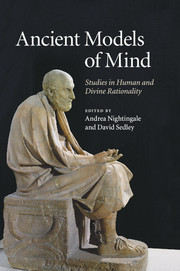Book contents
- Frontmatter
- Contents
- List of contributors
- Introduction
- 1 Plato on aporia and self-knowledge
- 2 Cross-examining happiness: reason and community in Plato's Socratic dialogues
- 3 Inspiration, recollection, and mimēsis in Plato's Phaedrus
- 4 Plato's Theaetetus as an ethical dialogue
- 5 Contemplating divine mind
- 6 Aristotle and the history of skepticism
- 7 Stoic selection: objects, actions, and agents
- 8 Beauty and its relation to goodness in Stoicism
- 9 How dialectical was Stoic dialectic?
- 10 Socrates speaks in Seneca, De vita beata 24–28
- 11 Seneca's Platonism: the soul and its divine origin
- 12 The status of the individual in Plotinus
- A. A. Long: publications 1963–2009
- Bibliography
- Index
8 - Beauty and its relation to goodness in Stoicism
Published online by Cambridge University Press: 06 December 2010
- Frontmatter
- Contents
- List of contributors
- Introduction
- 1 Plato on aporia and self-knowledge
- 2 Cross-examining happiness: reason and community in Plato's Socratic dialogues
- 3 Inspiration, recollection, and mimēsis in Plato's Phaedrus
- 4 Plato's Theaetetus as an ethical dialogue
- 5 Contemplating divine mind
- 6 Aristotle and the history of skepticism
- 7 Stoic selection: objects, actions, and agents
- 8 Beauty and its relation to goodness in Stoicism
- 9 How dialectical was Stoic dialectic?
- 10 Socrates speaks in Seneca, De vita beata 24–28
- 11 Seneca's Platonism: the soul and its divine origin
- 12 The status of the individual in Plotinus
- A. A. Long: publications 1963–2009
- Bibliography
- Index
Summary
It is well known that the concept of to kalon in ancient Greek occurs in a wide variety of contexts. It applies to physical beauty, but it is also common in ethical contexts, where “honorable” or “noble” are often appropriate English translations, and where Cicero regularly Latinizes it as honestum. Nor does this exhaust the possible applications of the concept, to judge from the range of objects that receive the label kalon in Plato's dialogue devoted to the topic, the Hippias Major; not only gods and beautiful young women, but also horses, lyres, cooking pots, and soup ladles are described as kala, apparently without controversy. In the last two cases, at any rate, what seems to entitle them to the epithet kalon, if it is justified, is not anything to do with a pleasing physical appearance, but, roughly, their appropriateness for the job they are supposed to do. No doubt this multiplicity of possible applications is one reason why Socrates and Hippias fail to find a satisfactory definition of to kalon, and why their various attempted definitions are so extremely different from one another. Although it is a recurring contention of Socrates in Plato's dialogues that each word must have a unitary sense in all of its various occurrences, the example of the term to kalon, as illustrated by the Hippias Major, seems to put that contention into question.
- Type
- Chapter
- Information
- Ancient Models of MindStudies in Human and Divine Rationality, pp. 130 - 152Publisher: Cambridge University PressPrint publication year: 2010
- 3
- Cited by



